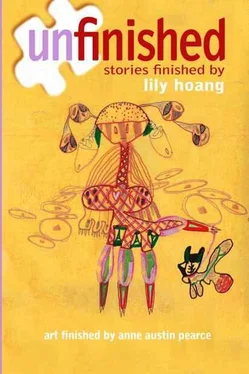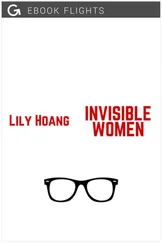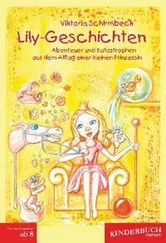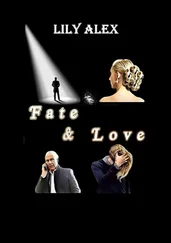Lily Hoang - Unfinished - stories finished by Lily Hoang
Здесь есть возможность читать онлайн «Lily Hoang - Unfinished - stories finished by Lily Hoang» весь текст электронной книги совершенно бесплатно (целиком полную версию без сокращений). В некоторых случаях можно слушать аудио, скачать через торрент в формате fb2 и присутствует краткое содержание. Издательство: Jaded Ibis Press, Жанр: Современная проза, на английском языке. Описание произведения, (предисловие) а так же отзывы посетителей доступны на портале библиотеки ЛибКат.
- Название:Unfinished: stories finished by Lily Hoang
- Автор:
- Издательство:Jaded Ibis Press
- Жанр:
- Год:неизвестен
- ISBN:нет данных
- Рейтинг книги:5 / 5. Голосов: 1
-
Избранное:Добавить в избранное
- Отзывы:
-
Ваша оценка:
- 100
- 1
- 2
- 3
- 4
- 5
Unfinished: stories finished by Lily Hoang: краткое содержание, описание и аннотация
Предлагаем к чтению аннотацию, описание, краткое содержание или предисловие (зависит от того, что написал сам автор книги «Unfinished: stories finished by Lily Hoang»). Если вы не нашли необходимую информацию о книге — напишите в комментариях, мы постараемся отыскать её.
Unfinished: stories finished by Lily Hoang — читать онлайн бесплатно полную книгу (весь текст) целиком
Ниже представлен текст книги, разбитый по страницам. Система сохранения места последней прочитанной страницы, позволяет с удобством читать онлайн бесплатно книгу «Unfinished: stories finished by Lily Hoang», без необходимости каждый раз заново искать на чём Вы остановились. Поставьте закладку, и сможете в любой момент перейти на страницу, на которой закончили чтение.
Интервал:
Закладка:
In fact, even Blanche didn’t care enough to wake up for it.
I came here to find some hint of my mother, my real mother. Blanche has been a wonderful and more than perfectly adequate mother, but there’s something about blood.
I have to be honest: I was hoping there would be portraits — photographs — of me around the house. Perhaps it’s the egoist in me that desires others to deem me important enough to not only immortalize my existence but also want to display that very existence for others.
Or to be kinder to myself, I’d like to think that I wanted to see photographs hung, framed, mounted, so that I can be sure I was the baby here: proof.
There were photographs lined along one wall. Like everything in Iowa, they made straight perfect rows and columns. They were in chronological order, but they only showed the women who lived in the house.
1959: There are eight women, each with very stylish haircuts, ironed dresses, their hands properly folded. They look like waxed figurines. They are too perfect to be human. Like Blanche, they too are some form of mother to me.
I’m told that in a file box somewhere in some place, there’s a treasury of all the Polaroids and photographs taken during the year. I’m told if I was indeed a baby here, there would probably be pictures of me.
The boxes were lost in the shuffle though.
Some administrative assistant apologized profusely.
She could not even verify if I was a baby there.
When the practice babies were brought to the Richards House, they were given code names. Or rather: because these were mostly orphaned or poorly maintained babies, the students had the option of giving them new names.
After the allotted time at the Richards House, the practice babies were returned to the county to be delivered to either Child Protective Services or the orphanage. At which time these babies — no longer “practice” babies but not “real” babies — could be renamed. Records were often shoddy and the baby could be given several different names over the span of two years: the name their real mother gave at birth, the name the State gives (which could vary from birth name because many babies are abandoned at different points around the county), the name the students endow, the name the State gives (which could vary from the name they originally gave or that the students gave), and finally, the name the adoptive parents gives.
Unless, of course, the baby is unlucky and must enter the foster system. Although foster parents are encouraged to use the name the county gives a baby — for continuity’s sake — what happens within the boundaries of the home can never be known with any degree of certainty.
In fact, I once knew a foster father — a single father at that — who renamed all of his foster children Sally. He had over thirty foster children over the course of his lifetime, many of which were boys. Before I left the Adams-Richards House, I asked the administrative assistant for any information she could release about the students who lived in the house in 1959. She was kind enough to photocopy the file she had on hand.
Then, with a thick black marker in hand, she darkened the names from the copies. Then, she photocopied the photocopies. Even if I’d had the foresight to be clever, she outsmarted me.
I asked her if I could also have a copy of the photograph of the eight women from the hallway.
She photocopied the photograph.
Although I don’t have their names, I have their addresses and phone numbers from 1956. I have their college applications. I have their essays as to why they should be chosen for the year-long practice home experience. I have their copies of their final projects. I have their transcripts.
I don’t have any verification that I was there though. Not even a hint of my existence.
But I fear I’m moving further away from my mother. I’m drifting into Iowa’s clean columns and demarcations.
I’ve always envisioned my mother in something like chaos.
Here I am: moving the other way. And I’m excited about it.
Truth is: None of this should even matter to me. I’m a grown man. I’m successful. I’ve got this beautiful little daughter here, but the fact of it is that I’ve had the experience of the first year of her life, and all melodrama aside, it was pretty magical.
Those eight women experienced that first year of my life.
Blanche didn’t.
And my real mother didn’t. My real mother missed out on all that.
I hate her.
I’m thinking I should abandon her.
Like she abandoned me.
I’ve been told that talking to a baby expedites the language-learning process. Honestly, though, I think the woman who told me that just felt sorry for me. It’s not that she had any particular reason to feel sorry for me, and honestly, if I were a woman, she’d have probably seen nothing strange in my behavior, but you see a man by himself talking to a little baby, and all of a sudden, it’s like some water faucet, cute-fest, pity party ensues.
But yeah, I talk to Blanche all the time. For one, it helps to talk out difficult situations. Two, she’s a pretty good listener, although she obviously doesn’t respond in any coherent language. And three, it’s a bonding process. Whether or not she retains any active memory of this time or what I said to her, she’ll at least know that I cared enough to keep her informed.
I’d like to think the women from the college did the same for me.
I’d like to think they spoke to me softly, told me what to expect in the future, warned me. That should be part of the protocol.
That’s not what happened though. Instead, they probably cooed over me, constantly touching me, spoiling me, treating me like royalty. They made me fussy.
Even Blanche told me I was impossible when she’d first got me from the State: I’d wail the moment she stopped holding me, only eat freshly pureed fruits and vegetables (none of that canned shit for me!), sleep only when I was put into a rocking cradle. Little Blanche isn’t so different. Even though I was a pain for Big Blanche, I’d like to think that I was worth it. It’s worth it for my own daughter.
Whereas I’m unsure how my second eight mothers treated me (numerically speaking, I had an original mother — the one who abandoned me. Then, I had another eight for a year. Finally, my tenth mother — ten being a perfect number and all — was the one who kept me.), I know how Blanche cared for me. I know she kept active communication and never denied me any truth about my past or present.
I couldn’t have been any older than four when she taught me I was adopted.
And yes, there was a lesson in it. One that I have kept with me.
Blanche teaches by example: she took me to toy store and told me I could pick one teddy bear. I have a very clear memory of this. There were rows and rows of teddy bears. It may have been a store specializing in teddy bears and stuffed animals. I remember this because I asked if I could pick a stuffed goat instead, but Blanche made her rules clear: I had to pick a teddy bear (and no other animal) and give her a full explanation why before she would purchase it for me.
Blanche tells me I touched almost every bear in that shop. I picked up many of them for a test squeeze. I put my cheek and chin against their fake fur. Blanche tells me that even the shop owner was impressed by my thoughtful methods and obvious deliberations.
Finally, I picked a bear that I found at the very back of the shelf, shoved behind other bears. Its mouth was a little uneven. I’m told that I wanted this bear because it wasn’t perfect, like all the other bears, that it was different.
That must not have made it easy for Blanche — given that she probably didn’t want to explain to me how she chose me because I was damaged goods — but she managed to draw a parallel between my picking of bear to her picking of me. It was a clever scheme, and although I don’t remember all the details, I still have the bear.
Читать дальшеИнтервал:
Закладка:
Похожие книги на «Unfinished: stories finished by Lily Hoang»
Представляем Вашему вниманию похожие книги на «Unfinished: stories finished by Lily Hoang» списком для выбора. Мы отобрали схожую по названию и смыслу литературу в надежде предоставить читателям больше вариантов отыскать новые, интересные, ещё непрочитанные произведения.
Обсуждение, отзывы о книге «Unfinished: stories finished by Lily Hoang» и просто собственные мнения читателей. Оставьте ваши комментарии, напишите, что Вы думаете о произведении, его смысле или главных героях. Укажите что конкретно понравилось, а что нет, и почему Вы так считаете.






![О Генри - Неоконченный рассказ [An Unfinished Story]](/books/415443/o-genri-neokonchennyj-rasskaz-an-unfinished-story-thumb.webp)





